The Intel Skylake-D SoC series is expected to launch in 2018. The products have been delayed (yet again) but here is the expected initial OS compatibility matrix for some of the new platforms. Note, each vendor will have their own list of supported OSes. One of the biggest changes we are hearing is that this will be a generation of CPUs that we will start seeing lower 32-bit OS support. That is an overall industry trend that is picking up steam.
Intel Xeon D-2100 Platform Initial OS Compatibility Matrix
We wanted to point out a few bits. If you are using an unsupported OS that does not mean that you have no hope. What it does mean is that you will likely need to add drivers to your OS of choice. You will also likely be running on an unsupported platform so if you run into issues, vendors will likely point to the compatibility matrix and say farewell.
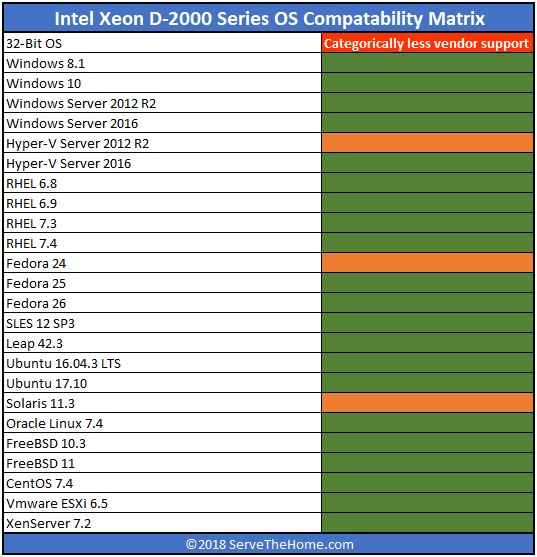
Another key point here is that each vendor may have different OS support. We used Supermicro’s as a point of reference since they track very closely with a superset of supported OSes for Intel platforms and it is available online. Check this before making a purchase once the chips become available in motherboards.
A good example of the unsupported, but it will likely work, is the Hyper-V Server 2012 R2 where Supermicro is not supporting the platform on Skylake-D, but if you have drivers for Windows Server 2012 R2 you likely can get a system to work with Hyper-V Server 2012 R2.
Skylake-D v. Broadwell-DE Preview
We do want to point out that Skylake-D and Broadwell-DE are going to operate in different segments. Some of the pre-release reporting makes it sound as though they are going to be direct replacements. Without getting into too many specifics, the new Skylake-D chips will occupy a space above Broadwell-DE in terms of price, performance, power consumption, TDP, and RAM capacity.
Since the introduction of Skylake-SP in June 2017, we have been recommending that those looking for small, low power, virtualization servers look into the Intel Xeon Silver line. While the new Skylake-D generation will have some generational platform upgrades, the Intel Xeon Silver 4100 series and Intel Xeon Gold 5100 series will be lower cost alternatives with more expandability and lower pricing. Total power consumption will be slightly lower with Skylake-D, but for virtualization servers, the ability to have more RAM and more PCIe/ SATA3 with Skylake-SP is going to be increasingly attractive as Skylake-D TDPs have gone up.
Like the previous generation of Xeon D, these will be soldered onto motherboards instead of socketed. That means that there is limited upgrade potential without an entirely new motherboard. It is also a strength for Xeon D as OEM customers of embedded systems prefer smaller form factors. Likewise, if you are an OEM building for a company like Facebook, the soldered chip design is easier to build into dense form factors such as Yosemite.
Final Words
We will have a larger review as we are allowed to post additional information if/ when the Xeon D-2000 series actually launches. Intel’s last embedded release, the Intel Atom C3000 series “Denverton” launched over three quarters after we first expected. For now, we hope this helps those who are considering purchases today. At the same time, if you are looking at a low TDP Broadwell-DE generation Xeon D (Xeon D-1500 series and the Pentium D1508), and those platforms work for you, they are going to continue to be viable alternatives.
For those considering the Intel Xeon D-2100 series or the Intel Atom C3000 series, there will be some performance overlap, as we saw with the previous generation parts. Heavy virtualization users that need to migrate workloads to the edge will look toward the Intel Xeon D-2100 series. Those looking for low power compute will look towards the Atom C3000 series.

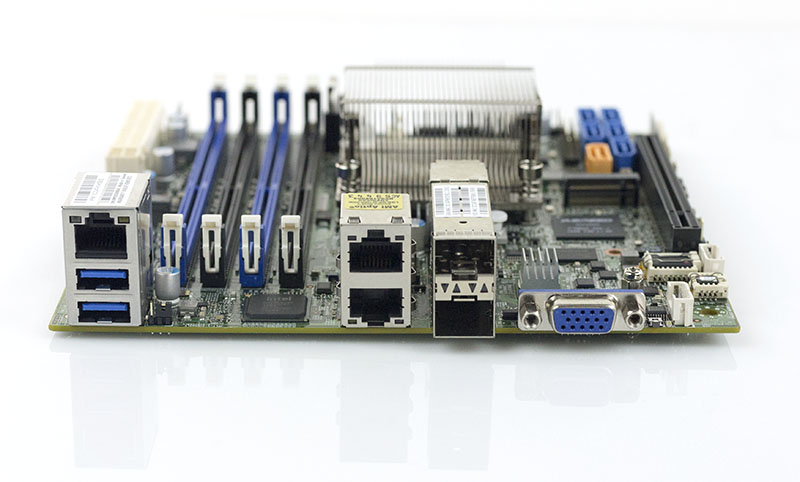
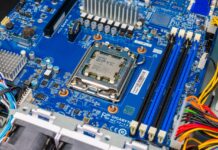
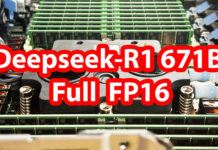
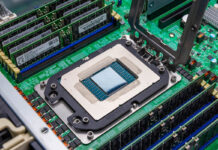
Asrock Rack for some reason, already have a D-2100 MB listed, by mistake perhaps, seems a bit early to list it
http://www.asrockrack.com/general/productdetail.asp?Model=D2100D8UM
Some noteworthy specs on that product listing:
* Supports up to 110w CPU:s, thats pretty high and not a guarantee that its the D-2100 max TDP part either
* 12 SATA ports, all seems to be “powered” by the D-2100, so no LSI or other 3rd party HBA/Raid chipset
* 512GB RAM which is insane, not long ago Intel limited the E3 platform to 32GB RAM, now we have a SOC that supports 512GB RAM, 8 dimms on that particular SKU, the spec list 128GB but the description lists 512GB, i am inclined to believe the 512GB is the correct one thanks to the 4 channel support on 8 DIMM slots.
Probably some more interesting stuff on the board, this particular SKU has a mezzanine design for a more modular design, pretty interesting, but yeah.
When is the NDA lifted for the D-2100?